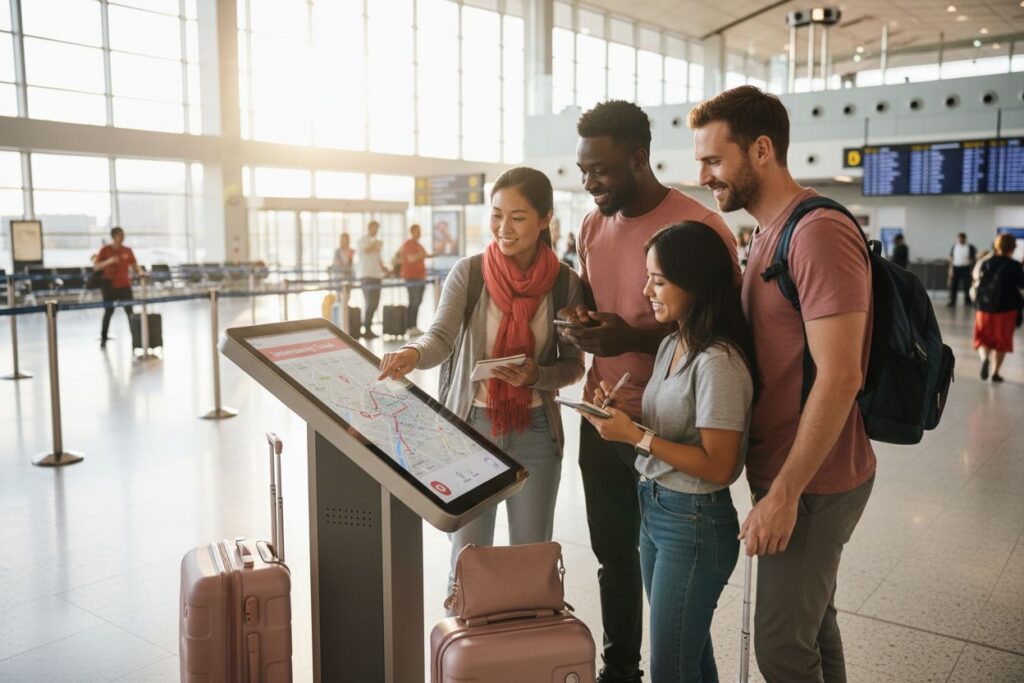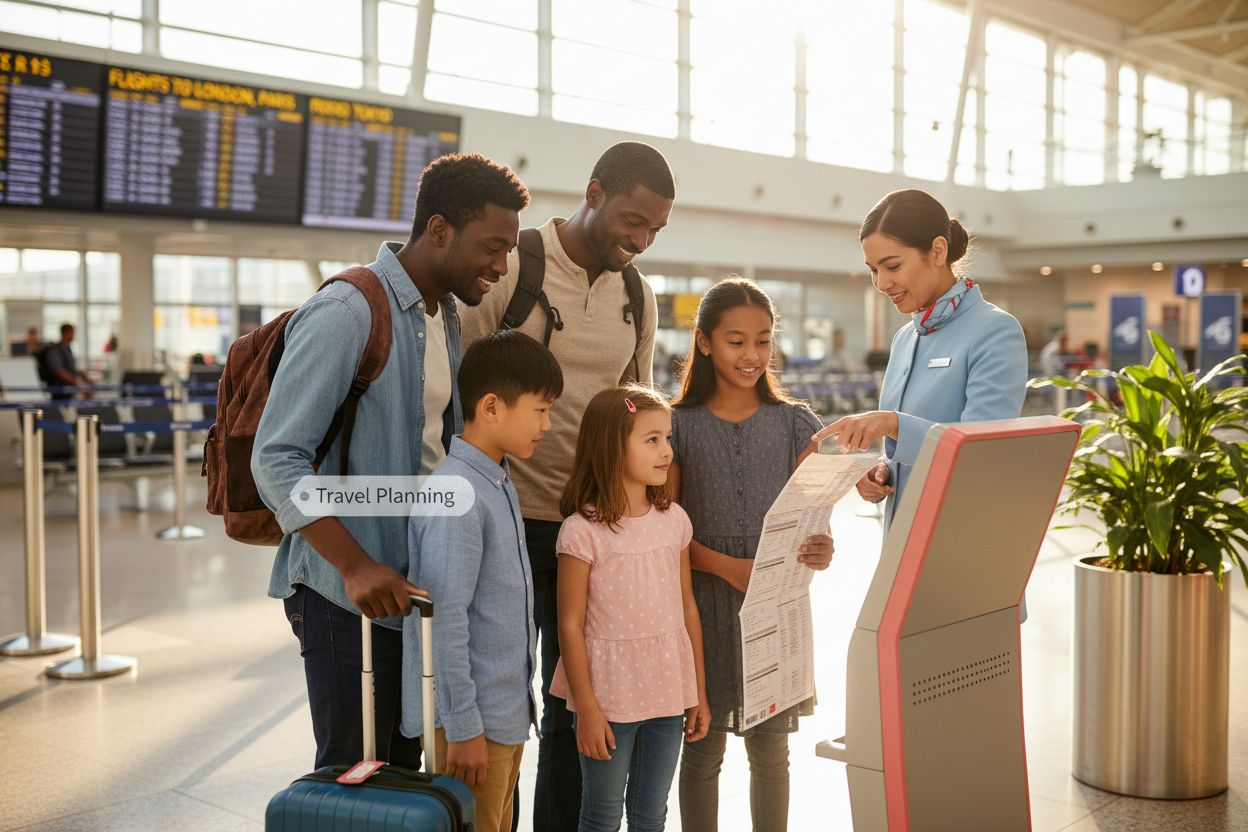Travel planning can feel overwhelming when juggling flights, hotels, and endless details. But did you know that thorough organization can slash trip stress by up to 65 percent? Most people treat travel like a mad dash, yet the real secret is a strategic approach that brings calm, clarity, and a whole lot more fun to your adventures.
Table of Contents
- What Is Travel Organization And Why It Matters
- Key Concepts Behind Effective Travel Planning
- How Travel Organization Enhances Your Travel Experience
- The Impact Of Technology On Travel Organization
- Practical Applications Of Travel Organization In Real Life
Quick Summary
| Takeaway | Explanation |
|---|---|
| Invest in thorough travel organization | A detailed organization process can reduce travel stress by up to 65% and enhance trip satisfaction significantly. |
| Embrace flexibility in your itinerary | Allow for spontaneous exploration and quick adjustments to ensure a more enjoyable travel experience. |
| Leverage technology for planning | Use digital tools for real-time information and customized trips, making travel planning straightforward and efficient. |
| Anticipate and prepare for challenges | Develop contingency plans and conduct thorough research to manage unexpected situations effectively during travel. |
| Focus on building a structured but adaptable approach | Combining meticulous preparation with flexibility enhances resilience and transforms ordinary trips into memorable adventures. |
What is Travel Organization and Why It Matters
Travel organization transforms chaotic trip planning into a strategic, enjoyable process that ensures smoother adventures. At its core, travel organization represents a comprehensive approach to planning, managing, and executing travel experiences with precision and intentionality.
Below is a table summarizing the key elements of effective travel organization as described in the section, providing a clear snapshot of each component and its focus.
| Element | Description |
|---|---|
| Itinerary Planning | Designing a structured schedule for trip activities and logistics |
| Budgetary Management | Allocating and controlling spending across all phases of travel |
| Logistical Coordination | Arranging transportation, accommodations, and scheduling details |
| Risk Assessment & Contingency | Identifying potential risks and preparing backup plans |
| Documentation Management | Organizing essential travel documents and paperwork |
The Fundamental Concept of Travel Organization
Travel organization goes beyond simply booking flights and hotels. It involves creating a holistic strategy that integrates multiple aspects of trip preparation. According to McKinsey Travel Research, travelers who invest time in detailed organization can reduce trip stress by up to 65% and improve overall travel satisfaction.

Key elements of effective travel organization include:
- Comprehensive itinerary planning
- Budgetary management
- Logistical coordination
- Risk assessment and contingency preparation
- Documentation and paperwork management
Why Travel Organization Matters
The significance of travel organization cannot be overstated. Proper planning prevents potential complications and transforms travel from a potentially stressful experience into an enjoyable journey. Learn more about advanced trip organization techniques to elevate your travel experiences.
Travelers who implement structured organization strategies benefit from:
- Reduced travel anxiety
- More efficient use of time and resources
- Enhanced ability to handle unexpected situations
- Greater flexibility and spontaneity during trips
- Improved overall travel experience
Whether you are a seasoned globetrotter or a first-time traveler, understanding and implementing solid travel organization principles can dramatically improve your adventures. By approaching travel with a strategic mindset, you create opportunities for memorable experiences while minimizing potential disruptions.
Key Concepts Behind Effective Travel Planning
Effective travel planning transcends basic booking logistics and requires a strategic approach that blends research, preparedness, and flexibility. Understanding the fundamental principles transforms travel from a potentially overwhelming experience into an exciting and smooth journey.
Strategic Research and Destination Understanding
Successful travel planning begins with comprehensive destination research. According to Centers for Disease Control and Prevention Travel Guidelines, thorough preparation involves understanding local health risks, cultural nuances, and practical travel requirements. Knowledge becomes your most powerful travel tool.
Key research focus areas include:
- Climate and seasonal variations
- Local cultural practices and etiquette
- Health and safety considerations
- Entry requirements and documentation
- Transportation infrastructure
Adaptive Planning and Flexibility
While detailed planning provides structure, exceptional travel experiences require built-in flexibility. Learn more about advanced trip visualization techniques to create dynamic travel strategies that accommodate unexpected opportunities and challenges.
Effective travel planning recognizes that rigid itineraries can limit spontaneity. Successful travelers develop frameworks that allow:
- Spontaneous exploration
- Quick adjustments to changing circumstances
- Balanced scheduling
- Realistic expectations
- Emergency contingency options
By embracing a holistic approach that combines meticulous preparation with adaptable thinking, travelers can transform potential stress into genuine adventure. The art of travel planning is not about controlling every moment but creating an optimal environment for memorable experiences.
How Travel Organization Enhances Your Travel Experience
Travel organization is more than a preparatory task. It represents a transformative approach that elevates travel from a simple journey to a rich, immersive experience. By strategically planning and managing travel details, individuals unlock potential for deeper connections, reduced stress, and enhanced personal enjoyment.
Psychological Benefits of Structured Travel Planning
Research in travel psychology demonstrates that organized travel significantly reduces anxiety and increases overall trip satisfaction. Systematic preparation creates a sense of control that allows travelers to approach new experiences with confidence and openness.
Psychological advantages of travel organization include:
This table compares how structured travel organization provides different psychological advantages to travelers, making it easy to understand specific benefits of adopting these techniques.
| Psychological Benefit | Explanation |
|---|---|
| Reduced Stress | Minimizes anxiety before and during travel |
| Personal Empowerment | Boosts confidence and sense of control over travel experiences |
| Enhanced Problem Management | Improves ability to handle unexpected situations confidently |
| Increased Bandwidth | Frees mental energy to fully enjoy destinations and activities |
| Emotional Resilience | Strengthens emotional response to challenges and changes |
- Reduced pre-trip and during-trip stress
- Increased sense of personal empowerment
- Enhanced ability to manage unexpected challenges
- Greater mental bandwidth for experiencing destinations
- Improved emotional resilience
Maximizing Travel Experiences Through Strategic Planning
Effective travel organization transforms potential obstacles into opportunities for exploration. Discover advanced trip organization strategies that turn ordinary trips into extraordinary adventures.
Key experience enhancement strategies involve:
- Creating flexible yet structured itineraries
- Anticipating potential logistical challenges
- Building buffer time for unexpected discoveries
- Balancing planned activities with spontaneous exploration
- Developing cultural sensitivity through advance research
Ultimately, travel organization is an art form that balances meticulous preparation with the beautiful unpredictability of exploration. By understanding and implementing strategic planning techniques, travelers can transform their journeys from mere transportation between locations into meaningful, transformative experiences that expand personal horizons and create lasting memories.
The Impact of Technology on Travel Organization
Technology has fundamentally revolutionized travel organization, transforming complex planning processes into streamlined, intuitive experiences. Digital tools have empowered travelers with unprecedented access to information, resources, and planning capabilities that were unimaginable just decades ago.
Digital Tools and Real-Time Information
According to University of Massachusetts Tourism Research Findings, emerging technologies have dramatically reshaped how travelers plan, execute, and experience their journeys. Digital platforms now serve as comprehensive travel management ecosystems, providing seamless integration of multiple travel components.
Key technological advancements include:
- Mobile travel applications
- Cloud-based itinerary management
- Real-time booking and modification platforms
- Artificial intelligence trip planning assistants
- Integrated communication and tracking systems
Personalization and Adaptive Travel Planning
Learn more about modern travel planning technologies that are transforming traditional travel preparation methods. Technology enables travelers to create highly personalized experiences that adapt dynamically to changing circumstances.
Technology-driven travel organization offers profound benefits:
- Instant access to global destination information
- Customizable planning interfaces
- Predictive travel recommendation engines
- Comprehensive risk management tools
- Seamless cross-platform synchronization
By embracing technological innovations, travelers can transcend traditional limitations, converting complex logistical challenges into manageable, enjoyable experiences. The future of travel organization lies not just in collecting information, but in intelligently interpreting and applying it to create truly extraordinary journeys.
Practical Applications of Travel Organization in Real Life
Travel organization transcends theoretical planning, manifesting as a critical skill that transforms potential travel challenges into seamless, enjoyable experiences. By implementing strategic approaches, travelers can navigate complex logistical landscapes with confidence and ease.
Scenario-Based Travel Preparation
U.S. Department of State Travel Guidelines emphasize the importance of comprehensive preparation. Effective travel organization means anticipating potential scenarios and developing adaptive strategies that accommodate diverse travel circumstances.
Practical preparation strategies include:
- Creating comprehensive digital and physical document backups
- Developing contingency plans for medical emergencies
- Understanding local cultural and legal requirements
- Establishing communication protocols with emergency contacts
- Securing appropriate travel insurance coverage
Real-World Problem Solving Through Organization
Discover comprehensive trip planning strategies that enable travelers to transform potential obstacles into opportunities for growth and exploration. Organized travelers develop a proactive mindset that turns unexpected challenges into manageable experiences.
Key real-world problem-solving techniques involve:
- Maintaining flexible itinerary frameworks
- Developing rapid decision-making skills
- Creating redundant communication and navigation methods
- Understanding local transportation alternatives
- Maintaining financial and logistical buffers
Ultimately, travel organization is about cultivating resilience and adaptability. By developing systematic approaches to travel planning, individuals can minimize potential stressors, maximize enjoyment, and create meaningful experiences that extend far beyond traditional travel expectations.

Say Goodbye to Disorganized Travel Plans — Discover Yopki’s All-in-One Solution
Have you ever felt overwhelmed trying to organize trip details, chase down confirmations, or make sense of scattered travel documents? If the stress of managing complex itineraries and adapting to unexpected changes sounds familiar, you’re not alone. This article emphasizes how comprehensive travel organization can reduce anxiety and help you truly enjoy your journey. Now, you can put those insights into action with Yopki—the travel app built to turn stressful planning into a seamless, enjoyable process.

Stop wasting hours on spreadsheets and endless research. Join thousands of travelers who have already upgraded to the ease of an intuitive itinerary app that helps you visualize your adventure, keep everything organized, and stay prepared for any situation. Take the next step toward stress-free travel and experience memorable moments with Yopki. Get started now at Yopki’s website and transform the way you plan every trip.
Frequently Asked Questions
What is travel organization?
Travel organization is a comprehensive approach to planning, managing, and executing travel experiences. It includes itinerary planning, budget management, logistical coordination, and risk assessment to ensure a smoother trip.
Why is travel organization important?
Travel organization is essential because it reduces travel anxiety, enhances overall satisfaction, allows for effective resource use, and helps handle unexpected situations, making the journey more enjoyable.
How can technology assist in travel organization?
Technology aids in travel organization through mobile applications, cloud-based itinerary management, real-time booking platforms, and AI trip planning assistants, which simplify the planning and execution of travel experiences.
What are the key elements of effective travel planning?
Key elements of effective travel planning include thorough destination research, adaptive planning for flexibility, risk management strategies, and creating structured itineraries that allow for spontaneous exploration.



